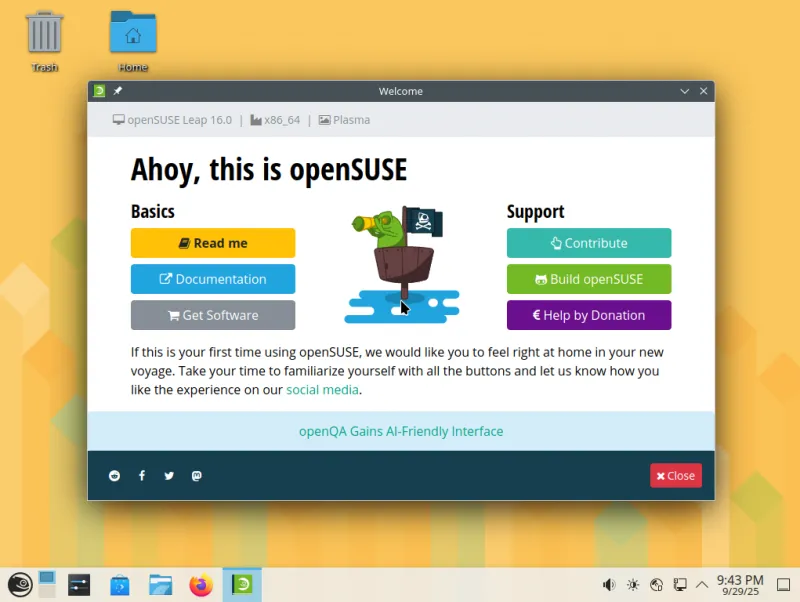 opensuse.org - New OpenSUSE Leap 16.0
opensuse.org - New OpenSUSE Leap 16.0
openSUSE Leap 16.0 is now available, bringing a sweep of updates across its core system, desktop environments, and administration tools. This new release is built on SUSE Linux Enterprise (SLE) 16 sources and the new SUSE Linux Framework One (formerly ALP), providing users with an enterprise-hardened base and extended testing capabilities. Under the hood, Leap 16.0 ships with Linux kernel 6.12 (LTS) – a jump from the 6.4 series in Leap 15.6 – and adopts a new lifecycle strategy: each minor release now enjoys 24 months of support. In fact, the project plans annual point releases through 2031 (up to Leap 16.6) before moving on to Leap 17 in 2032. This extended support model, combined with close alignment to SLE (guaranteed binary compatibility), ensures that Leap 16 remains both modern and stable for desktop and server deployments.
Modernized Installer and Management
openSUSE Leap 16 introduces a completely revamped installer and management stack. Agama, a web-based installer with a clean, modern interface, has replaced the traditional YaST setup program. Agama even supports remote access during installation, allowing administrators to monitor the setup from another device. Under the hood, the package manager is faster too: Zypper now fetches packages in parallel, significantly speeding up software installation and system updates. The classic YaST software module has been retired in favor of new tools – most notably Myrlyn, a Qt front-end to the ZYpp engine, and Cockpit, the integrated web console for system administration. A built-in migration tool is also included, making it easy to upgrade from Leap 15.x or switch to other branches, such as Tumbleweed or SUSE Linux Enterprise Server. Together, these changes represent a significant evolution from the installer and management approach of the Leap 15 series.
Updated Desktop Environments
Leap 16 adopts a Wayland-first strategy for desktops, delivering updated environments. The release offers three desktop options by default: GNOME 48, KDE Plasma 6.4, and an experimental Xfce 4.20 session (running on the new LabWC compositor). By default, the installer provides only the Wayland variants of these environments (users can add X11 sessions afterward if needed). This modern graphics stack offers improved security and performance; legacy X11 applications continue to run under XWayland for compatibility. In contrast to Leap 15.x, which shipped GNOME 45 and Plasma 5.27 LTS, the updated desktops in Leap 16 bring many new features and refinements to the user experience.
Security and Compatibility Changes
Leap 16 also makes significant security and compatibility changes. Notably, SELinux is enabled as the default security framework (in line with SUSE’s enterprise offerings), while AppArmor remains available as an option after installation. The audio stack has also been modernized: PipeWire replaces PulseAudio as the default sound server for the system, with existing PulseAudio configurations automatically migrated. Perhaps most impactful for older hardware, openSUSE Leap 16 is now 64-bit only: support for 32-bit binaries has been removed. In practice, this means all installation media and packages target x86_64 (or 64‑bit ARM/Power) exclusively. Furthermore, the minimum CPU requirement has been raised to the x86-64-v2 architecture (circa 2008-era AMD Phenom II/Opteron or Intel Nehalem CPUs). These changes improve overall system performance and security (including Y2038 readiness), but they mean that ancient 32-bit-only systems are not supported out of the box.
Performance and Hardware Optimizations
Under the hood, Leap 16 includes optimizations for modern hardware. The GNU C Library now supports HWCAPS, automatically loading CPU-optimized versions of key libraries on newer processors. This means math, crypto, and multimedia routines run faster without any manual tuning. On the CPU front, systems with AMD EPYC Turin (and later) processors default to the new AMD P-State driver, which provides more granular frequency scaling and power-efficiency controls than the old ACPI driver. Virtualization components have also been updated: QEMU 10.0.2 and libvirt 11.4 bring the latest features and bug fixes, and the kernel includes patches for technologies such as Intel TDX and AMD SEV-SNP for confidential computing (when hardware is available). Hardware support for non-x86 platforms has also expanded – for example, Leap 16 enables many new ARM SoCs, including Ampere Altra and AmpereOne, AWS Graviton2/3, Broadcom BCM2711 (Raspberry Pi 4), Fujitsu A64FX, and more. In short, openSUSE Leap 16 is tuned to run efficiently on cutting-edge servers and devices.
Lifecycle and Roadmap
With Leap 16, the openSUSE team has also formalized a new release cadence. Each Leap 16.x release will occur approximately once a year, with extended support periods. As noted, each minor version gets 24 months of updates, and users can expect Leap 16.6 (the sixth and final update in this series) around 2031. The immutable Leap Micro variant will follow the same yearly schedule. This predictable roadmap, combined with the ability to migrate easily to SUSE Linux Enterprise for even longer-term support, ensures that users get both the innovation of a community release and the reliability of an enterprise-grade system.
In summary, openSUSE Leap 16.0 is a substantial update over the 15.x series. It modernizes virtually every layer of the system – from the installer and system tools up through the desktop – while retaining Leap’s enterprise-tested foundation. General Linux users will notice faster installs, newer desktop apps, and broader hardware support, all backed by SUSE’s stable codebase and a two-year support policy. For more details and a complete changelog, see the official openSUSE Leap 16 announcement and release notes.
